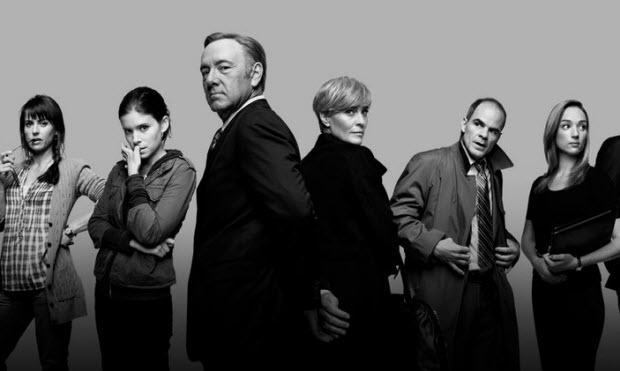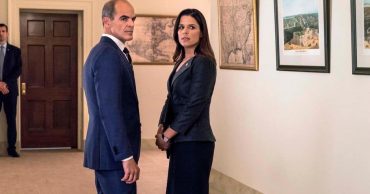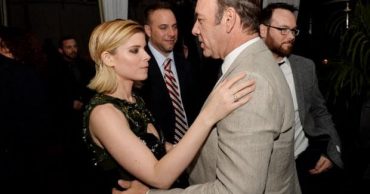
Ask and you shall receive. With the departure of Zoe Barnes, the most nagging and displaced plotline of House of Cards‘ second season has been tracing how her investigation into Frank’s involvement with Peter Russo’s death has been passed on. With no real direction – especially now that Lucas is in jail and Janine is distancing herself as much as possible – these three episodes avoid the story altogether, creating different problems for Frank. That said, it’s not that there shouldn’t be characters trying to illuminate the things that could bring down Underwood for good. It’s just that something like that can’t happen until House of Cards is ready to wrap up, so keeping that development as minimal as possible is the best solution.
Instead, Raymond Tusk is back at the front of the battlefield with Frank, trying to reclaim his place next to the president or at least within his good graces. Tusk throws everything that he can at Frank, which is mostly gossip-style slander regarding Claire’s affair and Freddy’s history of gang involvement (including his son’s, too). They’re all cheap shots, but at the same time, the campaign against Frank seems like child’s play compared to what we’ve seen Frank do to people who stand in his way. Remy is the one working for Tusk in this case as he tries to dig up anything he can. There’s nothing that leads to either Russo’s or Zoe’s murder, which also makes the stuff Tusk uses seem even more petty, but it’s good to see Tusk posing some kind of threat again. House of Cards seems to suggest that there is no one in its world who is Underwood’s equal, but if several antagonists can team up, maybe they can win small battles in the war.
Remy is also getting intimately involved with Jackie, which presents a bunch of questions. Given how two-faced everyone in this universe is, it’s impossible to tell if Remy is being genuine about his feelings towards Jackie or if he’s trying to manipulate her into thinking she can manipulate him. We don’t really have much of a personal connection to either character, so the romantic aspect of the relationship doesn’t matter in the end, but it would be nice to get a sense of what these characters’ motivations are in building this connection.
Only slightly more clear is the closest thing to a real romantic relationship House of Cards has in Rachel and Lisa. Given how forced their initial conversation on the bus was at the beginning of the season, it’s not unreasonable to anticipate Lisa being a well-placed piece of someone’s puzzle to get to the information that Doug is trying to keep Rachel quiet about. But other than how sketchy that first encounter was, Rachel and Lisa have seemed to naturally gravitate toward each other and can relate in ways that make them feel less alone by them being together. House of Cards tends to treat relationships between people as anything but romantic, so in that way it is interesting that one of the more prominent ones so far is a same-sex coupling, but any kind of stance taken on that issue is absent and, really, doesn’t need to happen for the story to work.
What’s not really working is the failing marriage of Garrett and Patricia Walker. How it is being played appears to be Frank and Claire finding weaknesses in the First Couple (which, we can only assume, is a ploy to eventually be the presidential candidate for 2016), but the characters are too unconvincing to begin with that there is a problem with connecting to this part of the story. It’s stated bluntly that being a hypocrite and lying is what gets politicians to higher ground, and Garrett doesn’t seem to fit the bill. He’s too honest and naive of a character to be the president, so manipulating him in the way Frank does doesn’t create any shock or interest. Garrett doesn’t understand the sinister work that’s gone in to getting Linda to resign, and coming to Frank to ask for his advice exposes him as being too far out of the loop of the scheming we see in this series.
Claire’s story is similarly faltering a little bit, but it has nothing to do with her being uninteresting. Her position as a figure against abuse gives her plenty to do; however, nothing has amounted. Claire’s conversation with Megan Hennessey just before Megan is supposed to talk to the press is the closest the story gets to hitting a high mark, because Claire shows her strength and admits that the whole situation is about her. She tries to play that off in an attempt to convince Megan that she’s right to feel nervous. Yet, we know that Claire really is just using Megan as a pawn in her own game, just as she uses Adam to her advantage.
The best bits of these episodes go to Freddy, who shifts from the status of tertiary character to one of utmost importance to House of Cards‘ message and heart. Freddy loses his BBQ joint, his son gets locked up for breaking parole and the press releases the information that Tusk digs up on Freddy’s background, including a manslaughter charge that involved the deaths of senior citizens. Frank considers Freddy one of his own men, and it’s great seeing Frank go out of his way to try to protect Freddy’s integrity. But politics is a messy business that includes casualties, Freddy being just one of them. The conversation that takes place between Frank and Freddy at Freddy’s home fits in nicely with all the strong dialog work that’s been done this season, the most impacting of which is Freddy’s explanation of why he won’t accept any money from Frank. It’s not pride. Freddy’s just a person who has been fending for himself and fighting his own battles for so long. Rather than dwell on what’s been done, Freddy sees only the path necessary to make a future for himself. In this way, he’s a huge loss to Frank because he really is a friend – one with whom Frank shares so many ideals.
[Photo via Netflix]
 Follow Us
Follow Us





